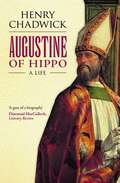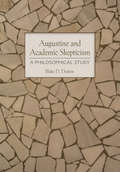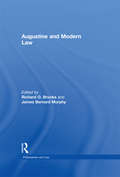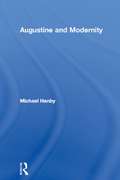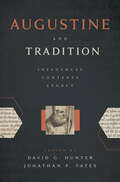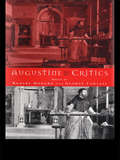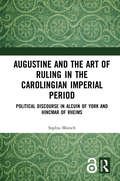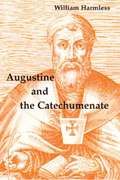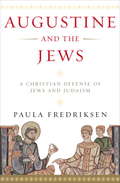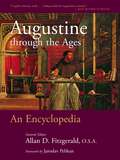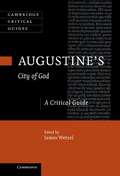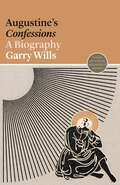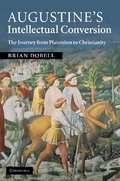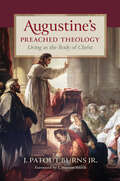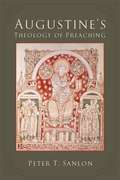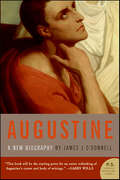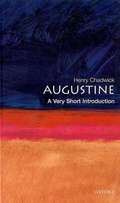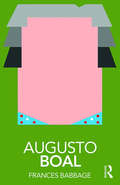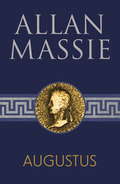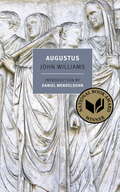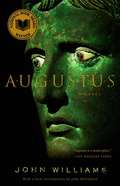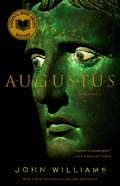- Table View
- List View
Augustine Deformed
by John M. RistAugustine established a moral framework that dominated Western culture for more than a thousand years. His partly flawed presentation of some of its key concepts (love, will and freedom), however, prompted subsequent thinkers to attempt to repair this framework, and their efforts often aggravated the very problems they intended to solve. Over time, dissatisfaction with an imperfect Augustinian theology gave way to increasingly secular and eventually impersonal moral systems. This volume traces the distortion of Augustine's thought from the twelfth century to the present and examines its consequent reconstructions. John M. Rist argues that modern philosophies should be recognized as offering no compelling answers to questions about the human condition and as leading inevitably to conventionalism or nihilism. In order to avoid this end, he proposes a return to an updated Augustinian Christianity. Essential reading for anyone interested in Augustine and his influence, Augustine Deformed revitalizes his original conception of love, will and freedom.
Augustine Of Hippo: A Life
by Henry ChadwickAugustine (354-430) had a profound impact on the development of the Christian Church, sparking controversy and influencing the ideas of theologians for over fifteen centuries. His words are still frequently quoted in devotions today and his key themes retain a striking contemporary relevance--what is the place of the Church in the world? What is the relation between nature and grace? In Augustine of Hippo, the late Henry Chadwick--a renowned authority on Augustine--describes with clarity and warmth the intellectual development of this key Father of the Church. In his characteristically rigorous yet sympathetic style, Chadwick traces Augustine's intellectual journey from schoolboy and student to Bishop and champion of Christendom in a period of intense political upheaval, providing valuable insight into the progression of Augustine's ideas. With a foreword reflecting on Chadwick's distinctive approach to Augustine by Peter Brown, and a further reading list on Augustine compiled by Gillian Clark, this volume is both an essential assessment of Augustine and a final tribute to one of the great church historians of the twentieth century.
Augustine and Academic Skepticism: A Philosophical Study
by Blake D. DuttonAmong the most important, but frequently neglected, figures in the history of debates over skepticism is Augustine of Hippo (354–430 CE). His early dialogue, Against the Academics, together with substantial material from his other writings, constitutes a sustained attempt to respond to the tradition of skepticism with which he was familiar. This was the tradition of Academic skepticism, which had its home in Plato's Academy and was transmitted to the Roman world through the writings of Cicero (106–43 BCE). Augustine and Academic Skepticism is the first comprehensive treatment of Augustine’s critique of Academic skepticism. In clear and accessible prose, Blake D. Dutton presents that critique as a serious work of philosophy and engages with it precisely as such. While Dutton provides an extensive review of Academic skepticism and Augustine’s encounter with it, his primary concern is to articulate and evaluate Augustine’s strategy to discredit Academic skepticism as a philosophical practice and vindicate the possibility of knowledge against the Academic denial of that possibility. In doing so, he sheds considerable light on Augustine’s views on philosophical inquiry and the acquisition of knowledge.
Augustine and Modern Law
by RichardO. BrooksSt. Augustine and Roman law are the two bridges from Athens and Jerusalem to the world of modern law. Augustine's almost eerily modern political realism was based upon his deep appreciation of human evil, arising from his insights into the human personality, the product of his reflections on his own life and the history of his times. These insights have traveled well through the ages and are mirrored in the pages of Aquinas, Luther and Calvin, Reinhold Niebuhr, and Hannah Arendt. The articles in this volume describe the life and world of Augustine and the ways in which he conceived both justice and law. They also discuss the little recognized Augustinian contributions to the field of modern hermeneutics - the discipline which informs the art of legal interpretation. Finally, they include Augustine's valuable discussion of church/state relations, the law of just wars, and proper role and limits of coercion, and the procreative dimensions of marriage. The volume also includes an extremely useful, definitive bibliography of Augustine and the law, and will leave readers with an increased appreciation of the contributions which Augustine has made to the history of jurisprudence. No one can read Augustine and these articles on his view of the law without taking away a new view of the law itself.
Augustine and Modernity (Routledge Radical Orthodoxy)
by Michael HanbyAugustine and Modernity is a fresh and challenging addition to current debates about the Augustinian origins of modern subjectivity and the Christian genesis of Western nihilism. It firmly rejects the dominant modern view that the modern Cartesian subject, as an archetype of Western nihilism, originates in Augustine's thought. Arguing that most contemporary interpretations misrepresent the complex philosophical relationship between Augustine and modern philosophy, particularly with regard to the work of Descartes, the book examines the much overlooked contribution of Stoicism to the genealogy of modernity, producing a scathing riposte to commonly-held versions of the 'continuity thesis'. Michael Hanby identifies the modern concept of will that emerges in Descartes' work as the product of a notion of self more proper to Stoic theories of immanence than to Augustine's own rigorous understandings of the Trinity, creation, self and will. Though Augustine's encounter with Stoicism ultimately resulted in much of his teaching being transferred to Descartes and other modern thinkers in an adulterated form, Hanby draws critical attention to Augustine's own disillusionment with Stoicism and his interrogation of Stoic philosophy in the name of Christ and the Trinity. Representing a new school of theology willing to engage critically with other disciplines and to challenge their authority, Augustine and Modernity offers a comprehensive new interpretation of De Trinitate and of Augustinian concepts of will and soul. Revealing how much of what is now thought of as 'Augustinian' in fact has its genealogy in Stoic asceticism, it interprets the modern nihilistic Cartesian subject not as a logical consequence of a true Christian Trinitarian theology, but rather of its perversion and abandonment.
Augustine and Tradition: Influences, Contexts, Legacy
by David G. Hunter, Jonathan P. YatesAn indispensable resource for those looking to understand Augustine&’s place in religious and cultural heritage Augustine towers over Western life, literature, and culture—both sacred and secular. His ideas permeate conceptions of the self from birth to death and have cast a long shadow over subsequent Christian thought. But as much as tradition has sprung from Augustinian roots, so was Augustine a product of and interlocutor with traditions that preceded and ran contemporary to his life. This extensive volume examines and evaluates Augustine as both a receiver and a source of tradition. The contributors—all distinguished Augustinian scholars influenced by J. Patout Burns and interested in furthering his intellectual legacy—survey Augustine&’s life and writings in the context of North African tradition, philosophical and literary traditions of antiquity, the Greek patristic tradition, and the tradition of Augustine&’s Latin contemporaries. These various pieces, when assembled, tell a comprehensive story of Augustine&’s significance, both then and now.Contributors: Alden Bass, Michael Cameron, John C. Cavadini, Thomas Clemmons, Stephen A. Cooper, Theodore de Bruyn, Mark DelCogliano, Geoffrey D. Dunn, John Peter Kenney, Brian Matz, Andrew McGowan, William Tabbernee, Joseph W. Trigg, Dennis Trout, and James R. Wetzel.
Augustine and his Critics: Essays In Honour Of Gerald Bonner (Christian Origins Ser.)
by Robert Dodaro George LawlessAugustine of Hippo (AD 354-430) is arguably the most controversial Christian thinker in history. His positions on philosophical and theological concerns have been the subjects of intense scrutiny and criticism from his lifetime to the present.Augustine and his Critics gathers twelve specialists' responses to modern criticisms of his thought, covering: personal and religious freedom; the self and God; sexuality, gender and the body; spirituality; asceticism; cultural studies; and politics.Stimulating and insightful, the collection offers forceful arguments for neglected historical, philosophical and theological perspectives which are behind some of Augustine's most unpopular convictions.
Augustine and the Art of Ruling in the Carolingian Imperial Period: Political Discourse in Alcuin of York and Hincmar of Rheims
by Sophia MoeschThis volume is an investigation of how Augustine was received in the Carolingian period, and the elements of his thought which had an impact on Carolingian ideas of ‘state’, rulership and ethics. It focuses on Alcuin of York and Hincmar of Rheims, authors and political advisers to Charlemagne and to Charles the Bald, respectively. It examines how they used Augustinian political thought and ethics, as manifested in the De civitate Dei, to give more weight to their advice. A comparative approach sheds light on the differences between Charlemagne’s reign and that of his grandson. It scrutinizes Alcuin’s and Hincmar’s discussions of empire, rulership and the moral conduct of political agents during which both drew on the De civitate Dei, although each came away with a different understanding. By means of a philological–historical approach, the book offers a deeper reading and treats the Latin texts as political discourses defined by content and language.
Augustine and the Catechumenate
by William HarmlessThis study examines a little-known side of Augustine: his work as a teacher of candidates for baptism. It reconstructs in vivid detail the experience of the ancient catechumenate for the better clarification and implementation of the present process.
Augustine and the Jews
by Paula FredriksenFredriksen (scripture, Boston U. ) places the third-century AD Augustine's defense of Jews in the context of the long history of the Greco-Roman Mediterranean civilization from the conquests of Alexander the Great in the forth century BCE to the beginning of the twilight of the western Christian empire in fifth-century. From there, she narrows her focus first to Augustine's life and thought, and again to the evolution and revolution of his theology of Jews and Judaism. Annotation ©2009 Book News, Inc. , Portland, OR (booknews. com)
Augustine through the Ages: An Encyclopedia
by Allan D. FitzgeraldThe definitive reference work on Augustine that scholars, from all fields of theological study, describe as "superb" and "indispensable" for students, scholars, libraries, and anyone interested in studying Augustine. While the work provides exhaustive resources on Augustine's own life and his theological and pastoral work, it also provides an exceptional wealth of information about scholarship, past and present on the great theologian. Moreover, it documents the influence of Augustine on the Catholic Church, the Reformation and on great thinkers and theologians such as Kierkegaard, Luther, Erasmus, and Calvin. Topics range from archeology to martyrdom, from imagination to Augustine's personal friends.
Augustine's City of God
by James WetzelAugustine's City of God has profoundly influenced the course of Western political philosophy, but there are few guides to its labyrinthine argumentation that hold together the delicate interplay of religion and philosophy in Augustine's thought. The essays in this volume offer a rich examination of those themes, using the central, contested distinction between a heavenly city on earthly pilgrimage and an earthly city bound for perdition to elaborate aspects of Augustine's political and moral vision. Topics discussed include Augustine's notion of the secular, his critique of pagan virtue, his departure from classical eudaimonism, his mythology of sin, his dystopian politics, his surprising attention to female bodies, his moral psychology, his valorisation of love, his critique of empire and his conception of a Christian philosophy. Together the essays advance our understanding of Augustine's most influential work and provide a rich overview of Augustinian political theology and its philosophical implications.
Augustine's Confessions: A Biography (Lives of Great Religious Books #3)
by Garry WillsFrom Pulitzer Prize–winner Garry Wills, the story of Augustine’s ConfessionsIn this brief and incisive book, Pulitzer Prize-winning historian Garry Wills tells the story of the Confessions--what motivated Augustine to dictate it, how it asks to be read, and the many ways it has been misread in the one-and-a-half millennia since it was composed. Following Wills's biography of Augustine and his translation of the Confessions, this is an unparalleled introduction to one of the most important books in the Christian and Western traditions.Understandably fascinated by the story of Augustine's life, modern readers have largely succumbed to the temptation to read the Confessions as autobiography. But, Wills argues, this is a mistake. The book is not autobiography but rather a long prayer, suffused with the language of Scripture and addressed to God, not man. Augustine tells the story of his life not for its own significance but in order to discern how, as a drama of sin and salvation leading to God, it fits into sacred history. "We have to read Augustine as we do Dante," Wills writes, "alert to rich layer upon layer of Scriptural and theological symbolism." Wills also addresses the long afterlife of the book, from controversy in its own time and relative neglect during the Middle Ages to a renewed prominence beginning in the fourteenth century and persisting to today, when the Confessions has become an object of interest not just for Christians but also historians, philosophers, psychiatrists, and literary critics.With unmatched clarity and skill, Wills strips away the centuries of misunderstanding that have accumulated around Augustine's spiritual classic.
Augustine's Intellectual Conversion: The Journey from Platonism to Christianity
by Brian DobellThis book examines Augustine's intellectual conversion from Platonism to Christianity, as described at Confessions 7, 9, 13-21, 27. It is widely assumed that this occurred in the summer of 386, shortly before Augustine's volitional conversion in the garden at Milan. Brian Dobell argues, however, that Augustine's intellectual conversion did not occur until the mid 390s, and develops this claim by comparing Confessions 7, 9, 13-21, 27 with a number of important passages and themes from Augustine's early writings. He thus invites the reader to consider anew the problem of Augustine's conversion in 386: was it to Platonism or Christianity? His original and important study will be of interest to a wide range of readers in the history of philosophy and the history of theology.
Augustine's Preached Theology: Living as the Body of Christ
by J. Patout Burns Jr.Vital insights from Augustine&’s sermons on the life of faith. Augustine is not usually thought of today as a preacher, but he delivered sermons weekly over the course of nearly forty years to his congregation in Hippo Regius and occasionally also in Carthage and other Roman cities he visited as bishop. The differences between his sermons and his theological treatises are striking but not surprising considering that the treatises targeted an elite, educated audience while his preaching was intended for Christians who lived—then as now—by the spoken and remembered rather than the written word. Where Augustine&’s treatises were intellectual, intricate, and theoretical, the rhetoric of his sermons is characterized by conviction, emotion, and a firm commitment to putting faith into action. This volume by renowned Augustine scholar Patout Burns explores the theology of Augustine&’s preaching. Utilizing recent advances in the chronological ordering of Augustine&’s extant sermons, Burns traces the development of their core thematic elements—wealth and poverty, sin and forgiveness, baptism, eucharist, marriage, the role of clergy, the interpretation of Scripture, the human condition, and the saving work of Christ. He also identifies the influence and manifestation of significant controversies in Augustine&’s preaching, most notably Donatism and Pelagianism. As Burns shows, most of Augustine&’s groundbreaking insights on the relation of Christ to Christians were developed in his sermons. Like any good preacher, Augustine strove to establish a dialogue between scripture and lived experience through his sermons—and did so quite effectively. Thus, pastors as well as scholars will benefit from Burns&’s insight into the teachings of one of the most effective ministers in Christian history.
Augustine's Theology of Preaching
by Peter T. Sanlon<p>Scholarship has painted many pictures of Augustine—the philosophical theologian, the refuter of heresy, or contributor to doctrines like Original Sin—but the picture of Augustine as preacher, says Sanlon, has been seriously neglected. When academics marginalize the Sermones ad Populum, the real Augustine is not presented accurately. In this study, Sanlon does more, however, than rehabilitate a neglected view of Augustine. <p>How do the theological convictions that Augustine brought to his preaching challenge, sustain, or shape our work today? By presenting Augustine's thought on preaching to contemporary readers Sanlon contributes a major new piece to the ongoing reconsideration of preaching in the modern day, a consideration that is relevant to all branches of the twenty-first century church. </p>
Augustine: A New Biography
by James J. O'DonnellSaint Augustine -- the celebrated theologian who served as Bishop of Hippo from 396 C.E. until his death in 430 C.E. -- is widely regarded as one of the most influential thinkers in the Western world. His autobiography, Confessions, remains among the most important religious writings in the Christian tradition. In this eye-opening and eminently readable biography, renowned historical scholar James J. O’Donnell picks up where Augustine himself left off to offer a fascinating, in-depth portrait of an unparalleled politician, writer, and churchman in a time of uncertainty and religious turmoil.Augustine is a triumphant chronicle of an extraordinary life that is certain to surprise and enlighten even those who believed they knew the complex and remarkable man of God.
Augustine: A Very Short Introduction
by Henry ChadwickAugustine was arguably the greatest early Christian philosopher. His teachings had a profound effect on Medieval scholarship, Renaissance humanism, and the religious controversies of both the Reformation and the Counter-Reformation. Here, Henry Chadwick places Augustine in his philosophical and religious context and traces the history of his influence on Western thought, both within and beyond the Christian tradition. A handy account to one of the greatest religious thinkers, this Very Short Introduction is both a useful guide for the one who seeks to know Augustine and a fine companion for the one who wishes to know him better.
Augustine: The City of God against the Pagans
by Augustine Of Hippo R. W. DysonThis is the first new rendition for a generation of The City of God, the first major intellectual achievement of Latin Christianity and one of the classic texts of Western civilization. Robert Dyson has produced a complete, accurate, authoritative and fluent translation of De Civitate Dei, edited together with full biographical notes, a concise introduction, bibliography and chronology of Augustine's life. The result is an important contribution of interest to students of theology, philosophy, ecclesiastical history, the history of political thought and late antiquity.
Augusto Boal (Routledge Performance Practitioners)
by Frances BabbageThis newly-updated volume looks at the scope of Augusto Boal's career from his early work as a playwright and director in Sao Paulo in the 1950s, to the development of his ground-breaking manifesto in the 1970s for a 'Theatre of the Oppressed'. Offering fascinating reading for anyone interested in the role that theatre can play in stimulating social and personal change, this useful study includes: a biographical and historical overview of Boal's career as theatre practitioner and director an in-depth analysis of Boal's classic text on radical theatre an exploration of training and production techniques practical guidance to Boal's workshop methods This is an essential introduction to the work of a practitioner who has had a tremendous impact on contemporary theatre. As a first step towards critical understanding, and as an initial exploration before going on to further, primary research, Routledge Performance Practitioners are unbeatable value for today’s student.
Augustus
by Allan MassieAugustus was the founder of the Roman Empire, adopted son of Julius Caesar, friend and later foe of Mark Antony, patron of Horace and Virgil. Frank and forceful, this putative autobiography tells his story from the assassination of Caesar, through his military, political and personal struggles to his final days as Emperor in everything but name.
Augustus
by John Williams Daniel MendelsohnWinner of the 1973 National Book AwardIn Augustus, the third of his great novels, John Williams took on an entirely new challenge, a historical novel set in classical Rome, exploring the life of the founder of the Roman Empire, whose greatness was matched by his brutality. To tell the story, Williams also turned to a genre, the epistolary novel, that was new to him, transforming and transcending it just as he did the western in Butcher's Crossing and the campus novel in Stoner. Augustus is the final triumph of a writer who has come to be recognized around the world as an American master."[In Augustus,] John Williams re-creates the Roman Empire from the death of Julius Caesar to the last days of Augustus, the machinations of the court, the Senate, and the people, from the sickly boy to the sickly man who almost dies during expedi- tions to what would seem to be the ruthless ruler . . . . Read it in conjunction with Robert Graves's more flamboyant I, Claudius and Claudius the God, Hermann Broch's The Death of Virgil, and Marguerite Yourcenar's Memoirs of Hadrian." --Harold Augenbraum, Executive Director of the National Book Foundation
Augustus
by John A. WilliamsA brilliant and beautifully written novel in the tradition of Robert Graves’ I, Claudius, Augustus is a sweeping narrative that brings vividly to life a compelling cast of historical figures through their letters, dispatches, and memoirs. <P><P> A mere eighteen years of age when his uncle, Julius Caesar, is murdered, Octavius Caesar prematurely inherits rule of the Roman Republic. Surrounded by men who are jockeying for power–Cicero, Brutus, Cassius, and Mark Antony–young Octavius must work against the powerful Roman political machinations to claim his destiny as first Roman emperor. Sprung from meticulous research and the pen of a true poet, Augustus tells the story of one man’s dream to liberate a corrupt Rome from the fancy of the capriciously crooked and the wildly wealthy.<P> Winner of the National Book Award
Augustus
by John WilliamsAUGUSTUS tells the story of Octavian, a shy and scholarly youth of nineteen who, on the death of his great-uncle, Julius Caesar, suddenly finds himself heir to the vast power of the Roman Empire. He is destined to rule that world astonishingly well, given the odds and intrigues against him. He would later be known as Augustus Caesar (63 B. C. -14A. D. ), the first Roman emperor. Through the use of fictional letters, memoranda and dispatches, we see how Augustus established his essential base of power and how he was continually obliged to put down, by a subtle combination of force and guile, the challenges of such men as Cicero, Brutus, Cassius and, finally, Mark Antony. The narrative mosaic John Williams has built on impeccable historical research brings Augustus vividly to life. Williams invests his characters with such profound humanity and treats them with such terrible honesty and compassion that we enter into their very lives and times.

